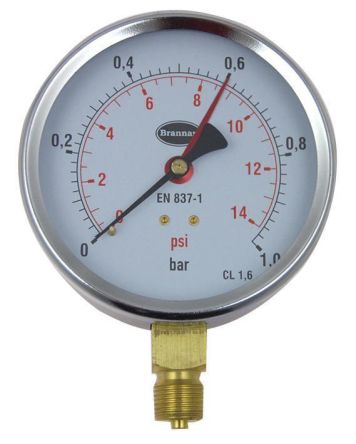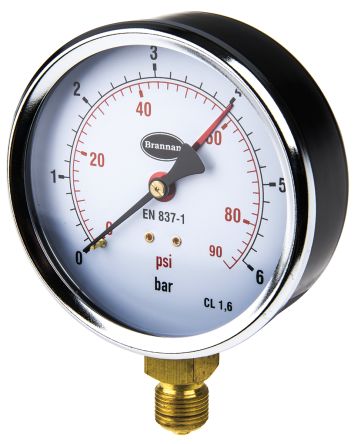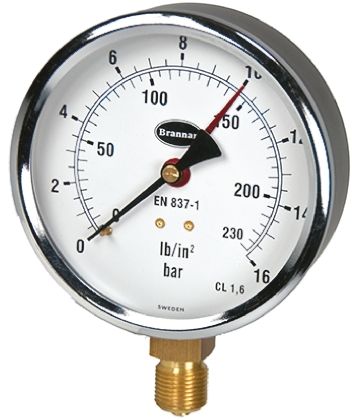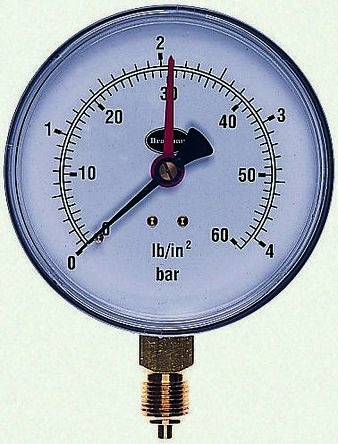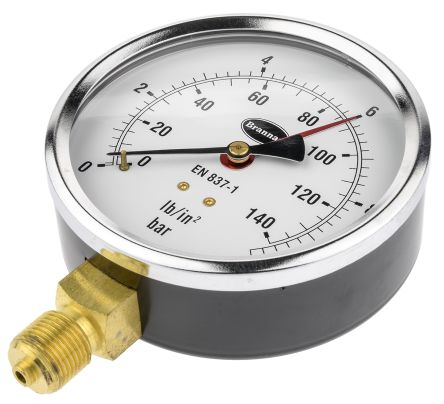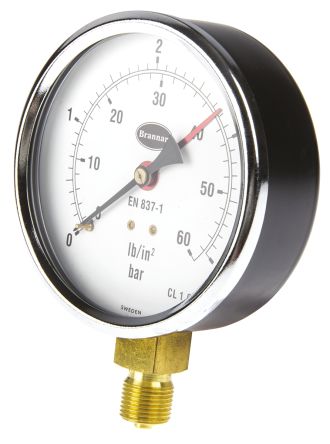- Automation & Control Gear
- Cables & Wires
- Enclosures & Server Racks
- Fuses & Circuit Breakers
- HVAC, Fans & Thermal Management
- Lighting
- Relays & Signal Conditioning
- Switches
- Batteries & Chargers
- Connectors
- Displays & Optoelectronics
- ESD Control, Cleanroom & PCB Prototyping
- Passive Components
- Power Supplies & Transformers
- Raspberry Pi, Arduino, ROCK, STEM Education & Development Tools
- Semiconductors
Brannan Pressure Gauges
Pressure gauges are essential instruments used in various industries across the Philippines to monitor and measure pressure or vacuum within a fluid power system. Whether you need to ensure the safe operation of industrial machinery, maintain optimal performance in pneumatic systems, or monitor pressure levels in hydraulic applications, a pressure gauge provides accurate and reliable readings.
At RS Philippines, you’ll find a comprehensive selection of pressure gauges, including analog pressure gauges, digital pressure gauges, and specialized gauges designed for specific industries and environments. We also provide a variety of pressure gauge accessories, ensuring you have everything you need for accurate pressure measurement and monitoring.
Types of Pressure Gauges
Pressure gauges are categorized into different types based on their display and functionality. Here are the types you’ll commonly find in the market:
Analog Pressure Gauges
Analog pressure gauges, also known as dial gauges, are widely used in the Philippines for their simplicity and affordability. These gauges display pressure readings on a circular dial with a needle that moves in response to pressure changes. Additionally, the needle's movement is controlled by a mechanical linkage connected to a pressure-sensing element.
It’s also worth noting that analog pressure meters are available in various pressure ranges, measured in psi (pounds per square inch) or bar. For instance, some pressure gauges can read pressures up to 5000 psi or 7500 psi, while others are designed for lower pressure ranges.
Digital Pressure Gauges
A digital pressure gauge offers enhanced accuracy and readability compared to analog gauges. At the same time, they use microprocessors and pressure sensors to provide precise readings on an integrated digital output display. Also, digital pressure gauges are ideal for low-pressure applications due to their high sensitivity, measuring pressure with resolutions ranging from 0.001 to 0.01.
Digital pressure gauges in the Philippines are commonly used in various industries, including hydraulics, pneumatics, and process control. They also offer features like data logging, alarm settings, and different pressure units, making them versatile tools for pressure measurement and monitoring.
Calibrated Pressure Gauges
Calibrated pressure gauges undergo a rigorous calibration process to ensure their accuracy and traceability to national standards. Plus, these gauges provide precise pressure measurements within a specified range.
Industries with strict accuracy requirements, such as aerospace, pharmaceuticals, and manufacturing, often rely on calibrated pressure gauges. These gauges are typically accompanied by a calibration certificate that verifies their accuracy and provides traceability to recognized standards. Also, calibrated pressure gauges are essential for maintaining quality control, ensuring process integrity, and meeting regulatory requirements in the Philippines.
Calibration and Maintenance of Pressure Gauges
Over time, pressure gauges can drift from their original calibration due to factors like wear and tear, temperature changes, or mechanical shocks. However, regular calibration ensures that your pressure gauge continues to provide accurate readings, enabling informed decision-making and preventing potential safety hazards.
Industries such as manufacturing, oil and gas, and pharmaceuticals rely on accurate pressure readings to maintain process control, ensure product quality, and comply with workplace safety regulations.
As a trusted pressure gauge supplier in the Philippines, RS offers in-house calibration services to help you maintain the accuracy of your pressure gauges. Our calibration services also ensure that your gauges meet the manufacturer's specifications and provide reliable performance.
Materials and Durability of Pressure Gauges
The materials used in pressure gauge construction play a role in their durability, accuracy, and suitability for different applications. Here are some of the most common pressure gauge materials:
- Stainless Steel: Stainless steel is a popular choice for industrial pressure gauges due to its excellent durability, corrosion resistance, and ability to withstand harsh environments. Also, this material is often used in applications involving high pressures, extreme temperatures, or corrosive fluids.
- Brass: Brass is another material for pressure gauges, offering good corrosion resistance and durability at a more affordable price point than stainless steel. This material is commonly found in pneumatic gauges and is suitable for a wide range of applications, including general industrial use and hydraulic systems.
- Plastic and Aluminum: Plastic and aluminum pressure gauges are lightweight alternatives to stainless steel and brass. Additionally, they are often preferred in applications where weight is a concern, such as portable equipment or panel-mounted gauges. However, it's important to consider their limitations in terms of pressure and temperature resistance compared to metal gauges.
Choosing the Right Pressure Gauge
Before you buy a pressure gauge, make sure to consider the following to identify the option that is compatible with your application:
- Pressure Range: Determine the expected pressure range of your system and choose a pressure gauge that can accommodate those values. Also, note that gauges are available with various pressure ranges, and if you need to measure high pressures, choose one that has a sufficient upper limit.
- Analog vs. Digital: Choose between analog and digital pressure gauges based on your preferences and application needs. For example, if you want a visual indication of pressure changes, opt for analog gauges. On the other hand, if you prefer easier readability and additional features like alarms and data logging, a digital gauge may be the best option.
- Durability and Materials: Consider the environment where the pressure gauge will be used and select a material that can withstand the conditions. As mentioned, stainless steel is a durable choice for industrial pressure gauges, offering excellent corrosion resistance and the ability to handle harsh environments. But if you prefer lightweight options, consider aluminum and plastic.
- Industry Standards and Guidelines: If your application requires compliance with specific industry standards or guidelines in the Philippines, ensure the chosen pressure gauge meets those requirements. This may involve certifications, accuracy standards, or material specifications.
Common Applications for Pressure Gauges
Pressure gauges are indispensable tools in various industries, providing insights into pressure levels within systems and ensuring safe and efficient operation. Here are some common applications for pressure gauges:
- Machinery and Automotive Components: Pressure meters play a vital role in monitoring hydraulic and pneumatic systems within machinery and automotive components. In hydraulic presses, pressure gauges ensure consistent pressure for optimal performance and prevent damage to the equipment. For the automotive industry, pressure gauges monitor various systems, such as cooling systems, braking systems, and fuel systems.
- Compressor Systems: Pressure gauges are integral to compressor systems, particularly in industrial settings. They monitor the air pressure in compressors used for processing lines, ingredient mixing, and pneumatic systems that power production lines. Accurate pressure readings ensure efficient operation, prevent equipment damage, and maintain product quality.
- Wind and Water Systems: In renewable energy and water management, pressure gauges are essential for monitoring hydraulic systems and ensuring efficient operation. In wind power facilities, for instance, gauges monitor hydraulic pressure pumps within wind turbines, contributing to smooth energy generation. Meanwhile, in water treatment plants, pressure gauges monitor water pressure throughout the treatment process, ensuring optimal filtration and distribution.
- HVAC (Heating, Ventilation, and Air Conditioning): Pressure gauges are widely used in HVAC systems to monitor and regulate pressure levels in air conditioning units, heating systems, and compressors. This ensures efficient operation, maintains occupant comfort, and extends the lifespan of HVAC equipment.
Buy Pressure Gauges in the Philippines
When you need to buy pressure gauges in the Philippines, turn to the trusted supplier in the country. At RS, we offer an extensive selection of high-quality pressure gauges to meet the diverse needs of industrial, commercial, and residential applications.
Plus, our collection includes pressure gauges from industry-leading brands like Bourdon, Fluke, WIKA, Druck, and, of course, RS PRO. So, whether you need a pressure gauge for industrial processes, hydraulic systems, pneumatic applications, or HVAC equipment, you know that you can get exceptional value, reasonable price points, and reliable performance from our products.
Browse our full range of pressure gauges today and find the perfect solution for your pressure measurement needs.
